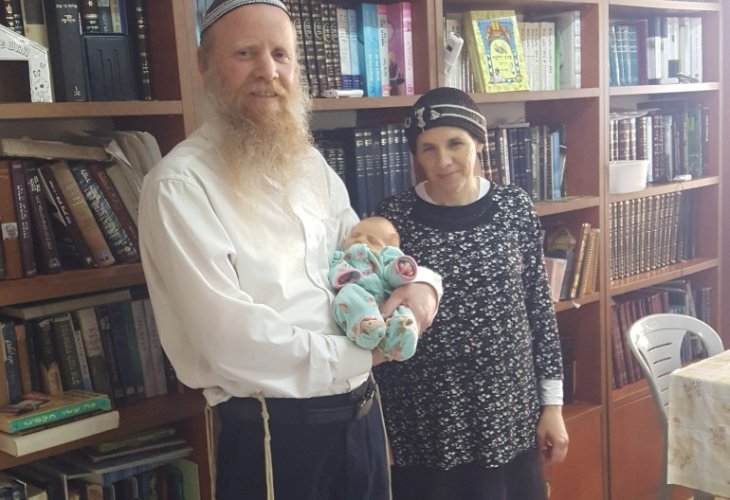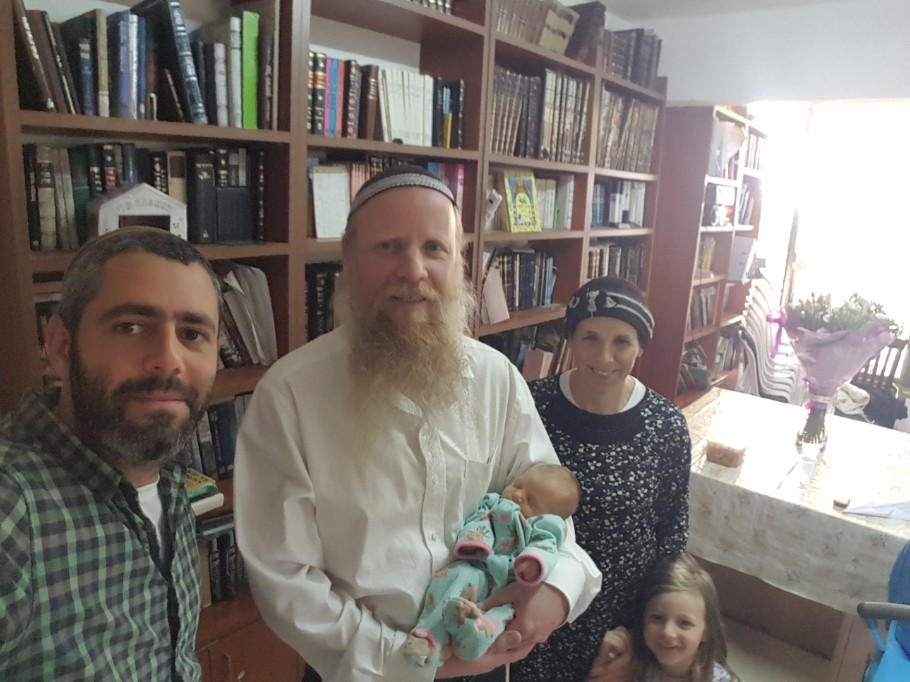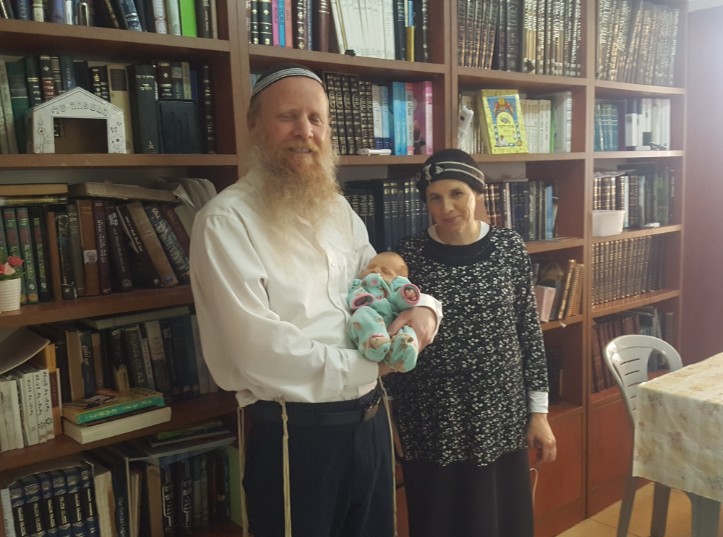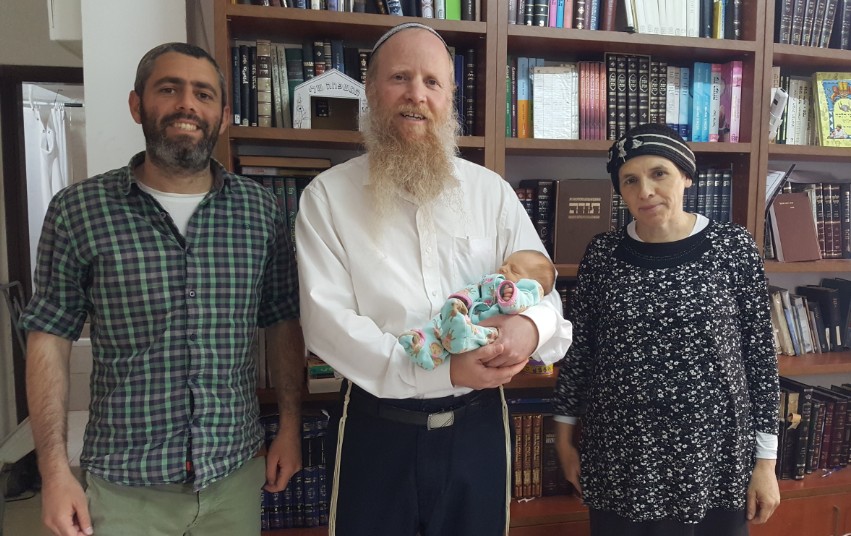Rabbi Eitan Shnerb: "Dvir Screamed, 'Dad, Dad,' But Rina Did Not. At That Moment, I Realized Our Lives Had Changed"
Eight months after Rina Shnerb was murdered while on a trip with her brother and father, Rabbi Shnerb shares the most difficult moments in his life, the religious and charitable initiatives that emerged following her death, the tzitzit that served as a tourniquet, and the great comfort that unexpectedly entered their lives as they welcome a new baby girl.

"Thank God, we have twelve children, yes, twelve – Rina is with us in spirit, even if not in body," Rabbi Eitan Shnerb, 47, the father of Rina Shnerb of blessed memory, tells me. She was murdered during a family outing to the Danny Spring located beneath the settlement of Dolev.
Describing that terrible day, he shares: "We always try to give attention to all the children, and during that period, I felt that I was more with the younger ones. Therefore, on Friday, about eight months ago, I went on an outing with my two older ones – Dvir and Rina."
Our conversation takes place on the eve of Memorial Day in the backyard of the Shnerb family home in Lod. As the conversation progresses, the strong connection between the Shnerb family and their hometown becomes clear. As part of their involvement with the religious community active in the city, the family runs several charitable foundations, which we will elaborate on later. Additionally, Rabbi Eitan teaches at the 'Tzviya' high school in the city, manages a kollel for married men that operates in its vicinity, and serves as the local community rabbi. Over two meters separate us as we sit under the shade of the blossoming trees in the Shnerbs' garden, as required during the corona period, but our hearts are very close.

"It was in the month of Av last year, during the vacation period," says Rabbi Shnerb. "I had a break from the kollel, and I told Dvir and Rina that I wanted to go on a trip with them. Dvir was studying at a yeshiva in Ali at the time, but even during the vacation period, he didn't have a single day off. Dvir wanted to pass a course to save lives, so during the break from yeshiva, he took a medics course, intended for the religious sector. I told him to take one day off, but he stayed committed to his goal.
"On one of the Thursday sessions of the course, they were suddenly told that the next day would be free. He updated me, and we decided to set out together on Friday. We took holy books, a guitar, and we wanted to dip in the spring in honor of the holy Shabbat, so we decided to go to 'Danny Spring', which is the closest spring to our home. We parked the car as close to the spring as possible and started walking. Dvir told me: 'Dad, let's not waste the time; ask me questions about what medics need to know'. I was a medic in the army, serving over 20 years in the reserves, so I have a lot of knowledge on the subject. I don't know why, but I specifically asked him about a tourniquet.
"We began to approach the spring, and suddenly a huge, terrifying explosion occurred. A crazy mushroom cloud of smoke. Several terrorists, may their names be erased, had planted an explosive device disguised as a rock, waiting for Jews to arrive and detonated it remotely. It was a massive shock. I found myself on the ground, everything around me pitch black. Black drops of dirt and soot flew in front of my eyes. Suddenly, amid all the madness around me, I heard Dvir shouting: 'Dad, Dad', but Rina didn't shout. At that moment, I understood that our lives were changed forever.
"It was hard for me to hear Dvir's cries, but at least I understood he was alive. I so wanted to hear Rina's cries too. I got up, walked towards her, bent over her, and began to shout, really scream: 'Rina, Rina'. I collapsed on her, kissed her, and realized there was no spirit of life in her. I tried to resuscitate her, even though I saw the injuries on her body, and understood that from such a thing, one doesn't survive. What comforted me, and later my wife, was that her face was not harmed. My wife didn't agree to bury Rina without seeing her. I thank Hashem that at least her face remained intact."
Child, Don't Go to Sleep
"After I realized what happened to Rina, I called Dvir to come close to me. Dvir was badly injured, so I took off my shirt and made him a tourniquet. I saw I didn't have enough cloth, so I made a second tourniquet using my tzitzit. Only afterward did I realize I was also injured. I tried to get up, but felt I couldn't move anymore. Later it was revealed I had a fractured pelvis, two broken ribs, fragments, and screws in my abdomen, and more.
"The injury to my abdomen worried me because I know it's a sensitive area. On the other hand, I assumed no internal organs or major blood vessels were damaged, and it calmed me. Dvir, however, was severely injured, in the chest and abdomen. I was genuinely concerned for his life. Just minutes before, my daughter was taken from me, and I prayed to Hashem not to lose another child. I was terrified I'd lose Dvir too. A few minutes later, he said he had difficulty breathing and wanted to sleep, to strengthen a little. I pleaded with him, told him not to sleep, as he might not wake up. I told him: 'You must be strong, you must live, for Rina and for all of Israel'. Dvir was a hero, held on tight, and didn't go to sleep."
I assume at this stage, you tried to call for help.
"Yes, about two minutes after the explosion, Dvir told me to call Magen David Adom. I have a phone without internet, an old Nokia, which survived the explosion. I wanted to call MDA, but I accidentally dialed my wife. I told her: 'There was an attack, call MDA, Dvir and I are injured'. I didn't want to report about Rina; I preferred she hear it from official sources. She asked whom to pray for, I told her for Dvir and me. She didn't ask about Rina because she thought she was okay. My wife called MDA, gave them my number, and they immediately called me.

"I was very objective during that conversation," Rabbi Shnerb states. "I told them: 'An explosive went off on us, we're at Danny Spring, my daughter was murdered, come quickly'. After about thirty minutes, an ambulance and military forces from Dolev and Neriah arrived. The ambulance took us to a helicopter, and from there we were flown to Hadassah Ein Kerem. The first thing Dvir told the medical team in the helicopter was that he had a blood type that could receive from anyone, but I could only take from his type, and they should take good care of me. He was very severely injured, I was relatively mild, and yet he thought of how to help me.
"And all this time, I continued to fear for his life. Even when he went into surgery, sedated and ventilated, I continued to worry. He underwent open abdominal surgery and still undergoes many treatments. They removed parts of his intestine and liver, but with God's help, it won't prevent him from serving in the army as a fighter. He wants this very much. Because I was hospitalized, I wasn't at Rina's funeral. I got out only on the last day of the shiva, when we went up to the grave.
"I'm glad I wasn't at the funeral because I don't connect with dwelling on death and cemeteries. The children went today, the eve of Memorial Day, to Rina's grave, but I didn't go with them. I want to be there only at the minimum necessary. To come when needed, say what needs to be said, and go. With the powers of life, one can reach much higher. The thousands of projects done so far in memory of Rina, and those that will be done with God’s help in the future, continue her life. Our focus should be on life, growth, Torah, and good deeds."
Together, the Tribes of Israel
Regarding life, growth, Torah, and good deeds, it is impossible not to be impressed by the Torah and charity empire that the Shnerb family and their friends have built in Lod, their hometown. "I am privileged to manage a kollel, which has been running for six years," Rabbi Shnerb tells me. "More than 20 married students study there, some of them take exams for rabbinical ordination, and the kollel is located within the high school where I teach. Thank God there is an excellent and fruitful connection between the students and the married students. I believe that in every high school yeshiva, there should be such a kollel.
"In addition, I serve as a community rabbi in the city. The 'Kalanit' community, named after the street where our synagogue is located. I am Ashkenazi; when you look at me, there is no mistaking it, but we mostly pray in the Sephardic tradition. In general, I am very connected to the Sephardic community. My mother always laughs about how my brothers and I were very drawn to Sephardic women. My older brother married the daughter of Rabbi Ovadia's cantor, and Rabbi Ovadia officiated at the wedding. My second brother married the daughter of Rabbi Ovadia's lawyer, and Rabbi Ovadia gave a sermon at the wedding. My mother says that until she had a son who married an Ashkenazi woman, he also went with the Sephardic."

What connects you to Sephardic customs?
"I am very connected to the simple and innocent Sephardic mentality, and I have tied my fate with the Sephardim. Although my halachic rabbis are Rabbi Yosef Tzvi Rimon and Rabbi Eliezer Melamed, the author of 'Peninei Halacha', most of the married students in our kollel are Sephardic Haredim. In general, 'Yalkut Yosef' at my home is part of the daily study. I am very close with Rabbi Yitzchak Yosef, who honored us with his presence and gave a sermon at the memorial of my father several years ago.
"As for the community," Rabbi Shnerb continues, "it includes members from the religious core and locals, Sephardim and Ashkenazim, all together. Our prayer service is mixed in its style. Further, we have established several community charity projects here in the city together with other families from the core. Much of our activity is done in memory of Rina. Right beyond our yard, there is a clothing charity. Everything here is second-hand, but in excellent condition, and each item is sold for a shekel; near the charity buildings, there is a center for youth, boys and girls separately, wanting to grow in Torah and mitzvot."
And what about food? I believe there are people in need of help with this, especially during the corona days.
"So far, thank God, we have helped over a thousand families in this area as well. Hundreds of families receive food packages every Friday through the community charity, and thank God it works excellently. In addition, we have five 'Shabbat Tables' centers in the city, where people can come to eat if they have nothing or miss the Shabbat atmosphere. Also, every Tuesday we host a large public reception, where dozens of families come every week to say what help they need. Ovens, glasses, courses, mental support, and so on. The cost of the things we give is very high, but with the grace of Hashem, we manage to cope. Most of our activity relies on donations from amazing people, and we have 500 volunteers. Generally, everyone involved with our charity and activity in Rina's memory does not receive even a shekel. Everyone acts for the sake of heaven."
"There's No Way We'll Name Her Rina"
Two days after the attack that shook his life, Rabbi Shnerb lay hurting and anxious in his hospital bed when suddenly, late at night, his phone rang. His wife was on the line with news he did not expect. "After the last of the consolers left our home, my wife called and told me she thinks she's pregnant. We weren't planning for this, but she said she notices signs that indicate so. Eight months after the murder, we are hugging a lovely and sweet baby girl. She was born less than a week ago. She hasn't even got a name yet; we're thinking of giving her a name perhaps on Independence Day.
"The nurse in the hospital, and others, asked if we'd name her Rina. There's really no chance. She's not a replacement. For us, Rina is still with us, and how can you have two kids in the same family with the same name? Our new baby, while very comforting and joyous to us, even healing us, she will never be a replacement."
As a believer, and as a rabbi in Israel, how are you dealing spiritually with the crisis that has befallen you?
"When I realized that Rina has been murdered, I understood everything is from Hashem and that He speaks to us through everything that happens. Yes, even through her death. I don't understand what Hashem does, and I don't understand why, but one thing is clear to me – it is all for the good. Beyond this, I also see with my own eyes how much good has come to the world after the difficult event we went through. Until now, there have been thousands of projects of kindness and Torah in her memory, thousands of lessons have been delivered, seminaries established, kollels, 30 'Shabbat Tables' locations throughout the country, second-hand stores, we have established an organization called 'Kol Rina', and more.
"These things help me see that this is all the hand of Hashem. My faith in Hashem has greatly strengthened through what happened to us. It is clear to me that everything is under divine supervision. Dvir and I walked a bit ahead of Rina, and during the terrorist trial, we understood that the terrorists intended to hit us. The terrorist who was supposed to trigger the explosive did not see the agreed signal well and detonated it a few seconds late. Rina was a little behind us, was closer to the explosive, and thus took the brunt of the blow.
"I thank Hashem that I had the privilege to learn faith. Those who learn faith methodically and seriously find it greatly helps in tough situations. In general, my main prayer these days is that we don't leave Hashem, despite all the difficulties. It is clear to me that Hashem will never leave us, but I pray deeply from my heart that we never leave Him. That we continue to cling to Him, even if we face the toughest challenges in the world."

